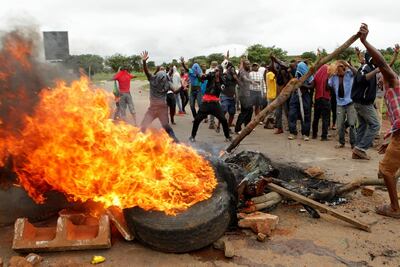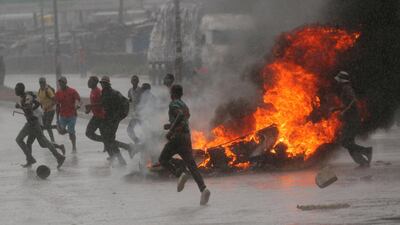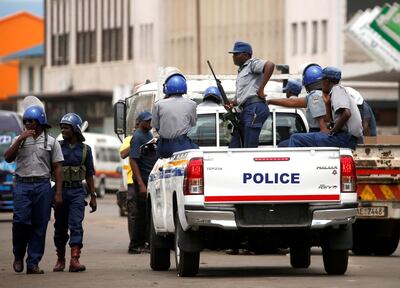Zimbabwean President Emmerson Mnangagwa landed in Harare early on Tuesday, following a week of state violence on the streets of the capital that conjured memories of the brutal Mugabe years.
Cutting short an international trip designed to dazzle foreign governments and investors, Mr Mnangagwa denounced police and state brutality as a “betrayal of the new Zimbabwe” and vowed to launch an investigation. “Heads will roll,” said the president.
He met his deputy, Constantino Chiwenga – a former army commander who presided over the crackdown in Mr Mnangagwa’s absence – on the runway.
Demonstrations began in Harare early last week after the price of fuel was more than doubled overnight. Trade unions organised a nationwide strike and some protesters blocked roads, threw rocks and looted. It reflected economic malaise with which Zimbabwe has long been synonymous, underpinned by low investor confidence and critical foreign currency shortages.

But the violent response from authorities, in which at least 12 people have been killed and hundreds beaten and detained, according to rights groups, shows how little has changed since the coup in 2017 that ejected Robert Mugabe and elevated Mr Mnangagwa, his former deputy and henchman.
“What we are seeing is essentially a page from the historic Zanu-PF crackdown playbook,” Charles Laurie, head of country risk at Verisk Maplecroft, said of Mr Mugabe’s former party.
As the protests gathered pace, police, military personnel and plain-clothes state security officers beat and detained protesters and carried out house raids in residential areas in Harare and Bulawayo, the second largest city. Many of those arrested are likely to face charges of treason or public disturbance and will incur legal costs even if found innocent.
A nationwide internet blackout and social media ban, which shielded much of the violence from the eyes of the world, was overturned by Zimbabwe’s high court on Monday.
_______________
Read more:
Mass protests in Zimbabwe after fuel prices more than doubled
Zimbabwe public workers reject latest wage offer amid protests
Zimbabwe's hopes of a post-Mugabe dawn dim after election
_______________
Meanwhile, the government has pointed its finger at the opposition MDC Alliance, taking the opportunity to arrest a handful of its MPs. MDC leader Nelson Chamisa came a close second to Mr Mnangagwa in a fraught election last July, and contested the result in court.
“There is nothing different between what we’ve seen in Harare over the past week and what we saw during the decades of Mugabe rule,” said Mr Laurie. “It is a key indicator of a lack of commitment to the now hollow claim that this is a new Zimbabwe.”
On Sunday, presidential spokesman George Charamba described the crackdown as “just a foretaste of things to come”.
“Possible flashpoints for further demonstrations include delays in the payment of public sector salaries, food shortages or a worsening in the ongoing scarcity of foreign currency,” said Tom Murphy, an intelligence analyst at Risk Advisory.
Once dubbed the breadbasket of Africa, with its vast plains of farmland and a bounty of platinum, a vital component in smartphones, Zimbabwe degenerated into an international pariah during 37 years of repressive Mugabe rule. Today, an estimated nine in 10 Zimbabweans are unemployed.
Despite his Zanu-PF background, Mr Mnangagwa was given an opportunity by millions of Zimbabweans and the international community to chart a new course for the southern African country, where inflation reached a staggering peak of 79.6 billion per cent in late 2008.
Mr Mnangagwa repeatedly declared the country “open for business” and planned to attend the World Economic Forum in Davos this week, as he did last year, until violence in the streets of Harare dragged him home.
“The first priority is to get Zimbabwe calm, stable and working again,” he tweeted.
Over Christmas, South Africa rejected an urgent request from Harare for a $1.2 billion loan, while attempts to foster monetary stability by printing cash has dented what little economic credibility the government had. “There have been few substantive changes to the operating environment for business the elections last year,” said Mr Murphy.
And the brutal, highly-public crackdown on demonstrators expressing valid economic grievances, and the use of the protests to target political opponents will further deter investors.
“This will have a dire chilling effect in the confidence of the international investment community and governments,” said Mr Laurie.
The consequence, analysts fear, will be further economic meltdown, more social unrest and, consequently, harsher state violence. And so the cycle continues in a country where political primacy matters above all else.


